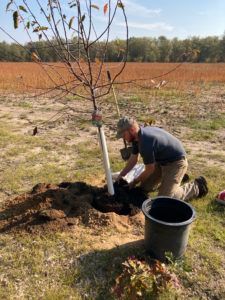On the Ground: MUCC Partners with NWTF and Camp Grayling to Continue Northern Michigan Wildlife Openings Enhancement Project

An OTG volunteer plants one of 100 crabapple trees during a partnership event with MUCC, NWTF, and Camp Grayling on Saturday, Oct. 2, 2021.
On Saturday, October 2, 2021, Michigan United Conservation Clubs’ On the Ground (OTG) program partnered with the National Wild Turkey Federation (NWTF) and Camp Grayling to plant 100 mast-producing trees throughout multiple openings within Camp Grayling.
A group of 31 volunteers met at the Grayling DNR Field Office Saturday morning before traveling as a group to the nearby project sites located along County Road 612. After providing volunteers with a quick demonstration showcasing how to properly prep and plant the trees, volunteers split up into three groups to tackle different openings across the property.
NWTF and Camp Grayling staff have been managing many of the openings for this project in partnership with the Michigan DNR. The primary species these openings are managed for is wild turkey, and the trees planted on Saturday will enhance the quality of habitat these openings provide for all wildlife in the area.
The 100 trees were planted along the northern edges of each opening, and each tree was planted with a mix of compost and topsoil to provide the trees with additional nutrients that they may not get from the sandy soils they were planted within. Thanks to valuable prep work completed by Camp Grayling natural resources staff and NWTF, all of the holes were augered and the trees and soil amendments were placed next to the planting sites.
Two different species of crabapple were selected for this project, and these soft mast-producing trees will provide food for wildlife such as wild turkey, white-tailed deer, elk, bear and songbirds.
If you would like to learn more about MUCC’s award-winning OTG program or volunteer for a wildlife habitat improvement event that interests you, please visit mucc.org/on-the-ground or contact MUCC Habitat Volunteer Coordinator Makhayla LaButte at mlabutte@gmail.com.
Recent Posts



